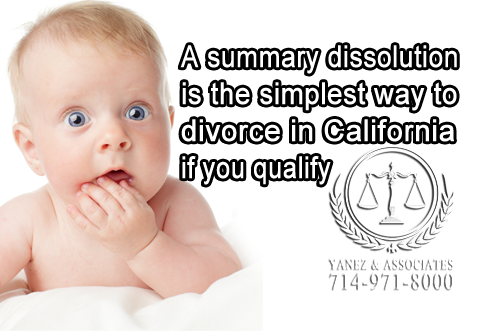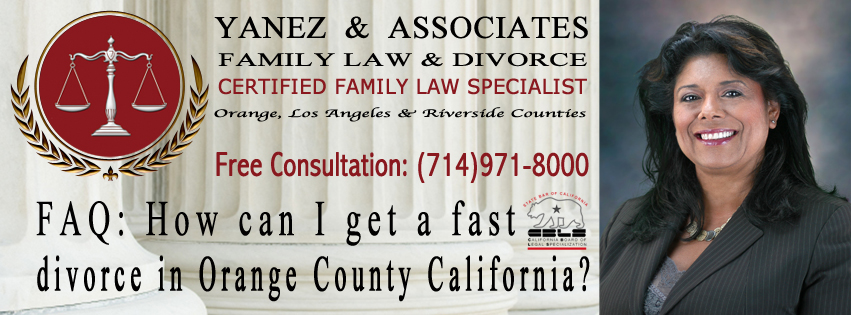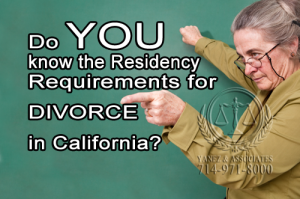FAQ How can I get a Fast Divorce in Orange County, California?
How can I get a fast divorce in Orange County California is a very common question divorce attorneys receive. Let me begin by saying, in California, there are three main ways to end a marriage or a registered domestic partnership: through a dissolution, otherwise called a divorce, through a legal separation, or through an annulment. The fastest way to get through your divorce is to work with an attorney and with your spouse to come to an agreement on the terms of your divorce outside of a courtroom.
A divorce allows the couple to end their marriage, resulting in court orders that divide the couple’s property and debt, initiate child and spousal or partner support, and determine child custody and visitation. Divorce has several time limits before the parties can file, and before the divorce can be finalized.
The more complex the divorce, the longer it will take. It is possible to qualify for a summary dissolution, which is the simplest and fastest way to get a divorce, but still requires the couple to meet the time limits of a divorce in California. A summary dissolution does not require a judge, and it can be difficult to qualify.
A legal separation does not end the marriage, but is an option to get started on the terms of the divorce if the couple does not yet qualify to file for a divorce. It also results in court orders regarding the division of property and debts, support for children, partners or spouses, and child custody and visitation.
An annulment, on the other hand, does not end a marriage but declares it legally invalid. An annulment has no residency requirement.
Time Limits on California Divorces
There are two major time limits for completing a divorce in California. First, in order to file for a divorce, the couple must meet the California residency requirements for filing for divorce in California. Depending on your marriage or registered domestic partnership, you may have to reside in California for a specified amount of time before you can file for divorce.
Second, a Divorce in California cannot be completed for a minimum of six months from the date of filing. This does not mean that all divorces will be completed in six months, or that the terms of your divorce cannot be determined much faster than six months. It does mean, however, that six months is the earliest point when each spouse or partner will be considered single, when the parties can file separate taxes, or can remarry.
Residency Requirements for Divorce in California
If a couple does not meet the requirements for a divorce in California, the couple can file for a legal separation, as long as one couple currently resides in California. A legal separation allows the couple to create a separation agreement, and then file for an amended petition when they meet the requirements for a divorce.
For a married couple to get a divorce in California, one spouse must have lived in California for at least the last six months, and one spouse must have lived in the county where they plan to file for divorce for at least the last three months.
A same sex couple that was married in California and currently lives outside of California in a state that does not recognize same sex marriages can file for a divorce in California, regardless of residency. However, it can be difficult to obtain child custody or support orders that can be enforced outside of California, and if you need these orders, you should discuss your case with an attorney.
If you and your partner registered your domestic partnership in California, you can get a divorce in California, even if neither of you have ever lived there. However, if your domestic partnership was not registered in California, one spouse must have lived in California for at least the last six months, and in the county where the divorce will be filed for at least the past three months.
Once you meet these requirements, you can file for divorce in California.
Qualifying for an Annulment
Annulment, while different from a divorce, is one of the fastest ways to end a marriage in California. In order to declare your marriage legally invalid, you have to prove that your marriage is invalid within the statute of limitations for filing for divorce.
Underage Marriage - If either spouse was married before turning 18 or without parental consent, the underage party can file for an annulment within four years of turning 18. The minor’s parent can request an annulment if the person is still under 18.
Prior Marriage or Partnership - If one party was already married or in a registered partnership at the time that the second marriage or domestic partnership was filed or registered, either party, or the prior spouse or partner can file for the annulment at any time.
Mental Incapacity - Either partner or spouse who believes that his or her spouse or partner is of unsound mind, or a relative of the partner or spouse who is of unsound mind can file for an annulment at any time.
Fraud - Within four years of discovering fraud, the person who was fraudulently forced to give consent to marriage or a registered domestic partnership can file for an annulment.
Physical Incapacity - Within four years of getting married or of registering the domestic partnership, either spouse can file for an annulment if he or she believes that his or her spouse or partner is physically incapacitated.
Qualifying for a Summary Dissolution

Looking for an Easy Divorce? Well did you know that a summary dissolution is the simplest way to divorce in California, IF you qualify!
A summary dissolution is the simplest way to divorce in California if you qualify. It does not require a judge, and may not require an attorney - but it is always in your best interest to consult an attorney when it comes to divorce.
For a married couple to qualify for a summary dissolution, the marriage must meet every criteria listed below.
• The marriage cannot have lasted for more than five years, from the date of the marriage to the date of separation;
• The couple cannot have any children together, whether born or adopted, before or during the marriage, and neither party can be pregnant;
• Neither party can own any part of land or any part of buildings;
• Neither party can rent any part of land or any part of buildings, with the exception of their current home;
• The couple cannot have acquired more than $6,000 in debts since the date of the marriage, excluding car loans;
• The couple must have acquired less than $40,000 in property since the date of the marriage;
• Neither party can have separate property (property acquired outside of the marriage) that is worth over $40,000;
• Both spouses have to agree to forego spousal support;
• The spouses must have a signed agreement that divides their property and debts, including vehicles;
• One spouse must have lived in California for at least the last six months;
• One spouse must have lived in the county where they will file for divorce for at least three months.
The requirements for a registered domestic partnership are the same, except for the residency requirements, which are the same as those to qualify for a divorce (listed above).
Find a Top Orange County Divorce Attorney
If you have any questions about filing for a divorce in California, it is always in your best interest to discuss your options with a skilled divorce attorney. Contact the family lawyers at Yanez & Associates today to schedule your free initial consultation.

Contact our law firm to learn more on, "How YOU can get a fast divorce in Orange County California?"















